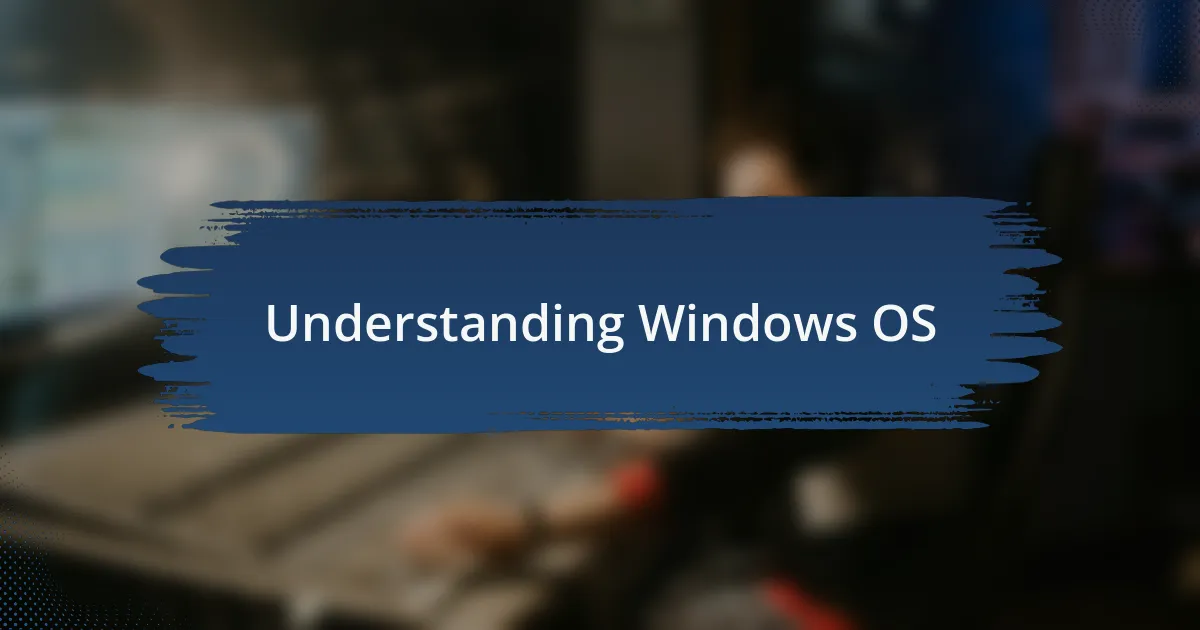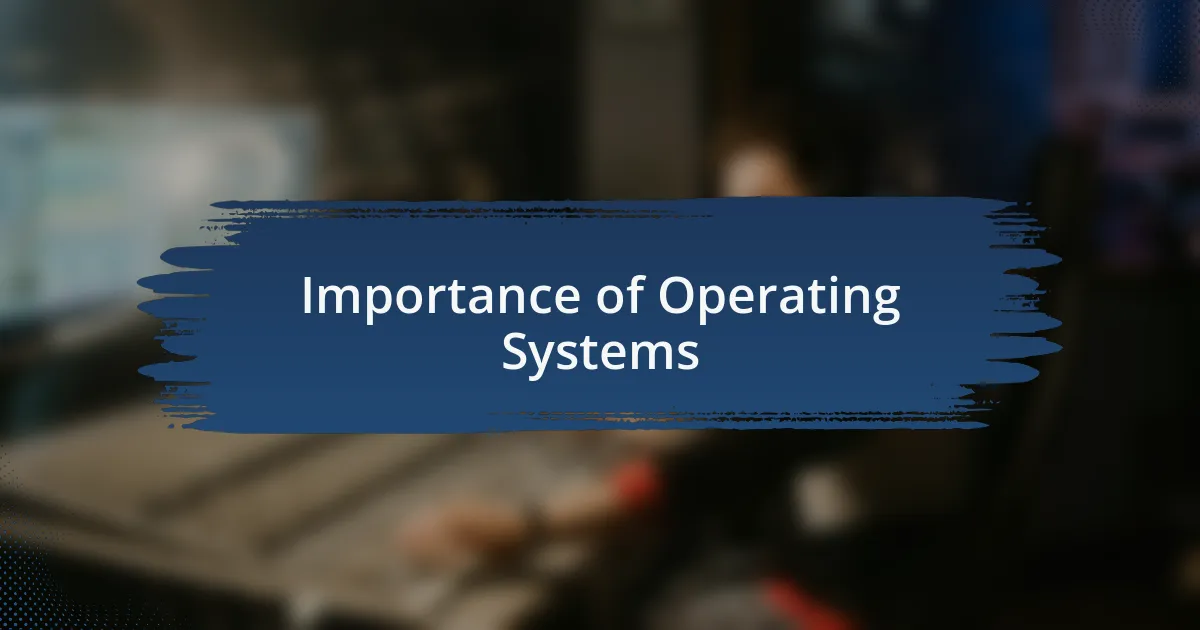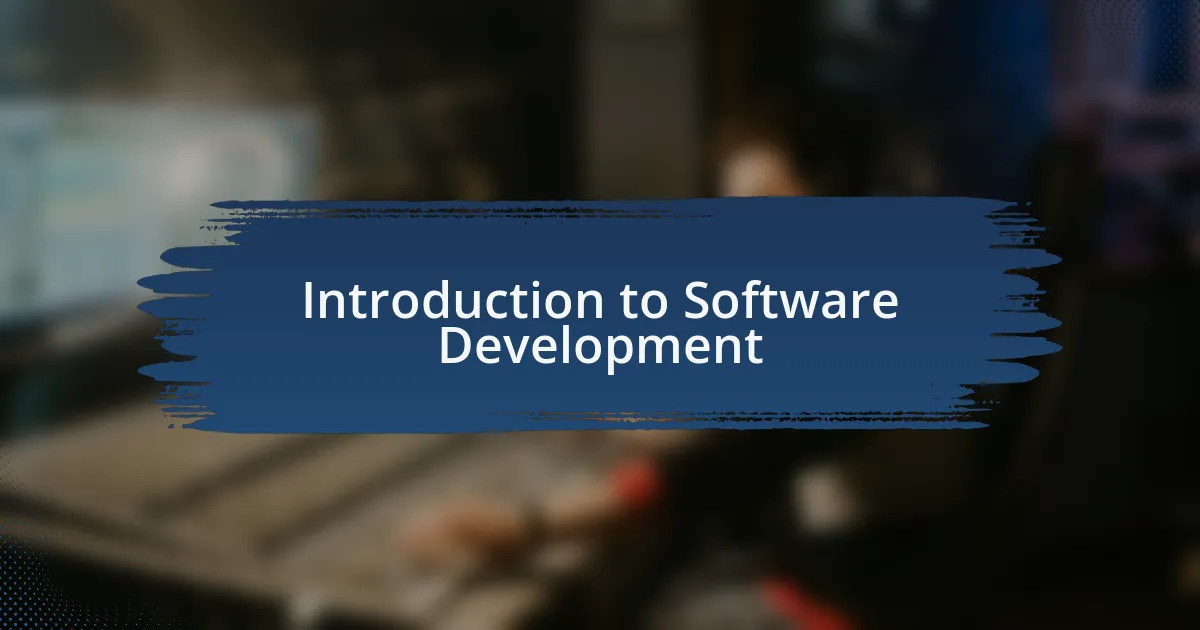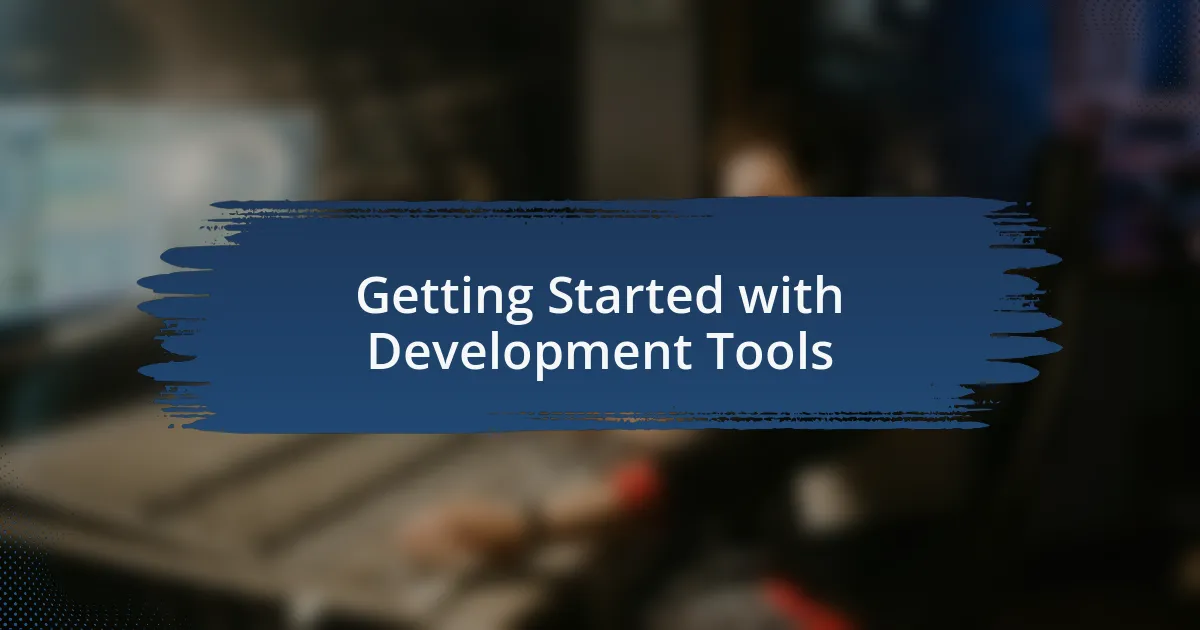Key takeaways:
- Windows OS shaped the author’s development journey, enhancing problem-solving skills through experimentation with the registry and file organization.
- Operating systems serve as critical interfaces between hardware and users, impacting software compatibility and necessitating robust security measures.
- Software development combines creativity and structured problem-solving, with an emphasis on lifelong learning and adaptability to evolving technologies.
- The right development tools and community support are vital for confidence and productivity, while overcoming challenges like imposter syndrome strengthens perseverance.

Understanding Windows OS
Windows OS is more than just an operating system; it’s a platform that has shaped my journey as a developer. I still remember the first time I booted up my old laptop running Windows XP. The user-friendly interface felt like a welcoming hand, introducing me to a world of endless possibilities—everything seemed accessible, from software applications to system tools.
As I delved deeper into understanding Windows, I encountered the concept of the registry—a database that holds critical settings and configurations. It was both fascinating and intimidating. I often found myself asking, “What happens if I change something wrong?” This fear led me to conduct countless experiments, ultimately teaching me valuable lessons about the intricacies of the OS and enhancing my problem-solving skills.
Navigating Windows’ file system structures also changed my perspective on organization and efficiency. I recall spending an entire weekend reorganizing files and tags in my projects, which not only made it easier to find things later but sparked a newfound appreciation for system architecture. Isn’t it interesting how mastering these small details can significantly boost productivity? Understanding Windows OS is like unlocking hidden doors; each new feature I learned revealed something that made my development work smoother and more enjoyable.

Importance of Operating Systems
Operating systems are the backbone of computing, serving as the crucial interface between the hardware and the user. I vividly remember spending late nights coding while my Windows OS quietly managed the complexity of processes behind the scenes. Without this seamless coordination, my journey as a developer would have been far more complicated and frustrating.
The importance of an operating system is also evident in how it enhances software compatibility. When I first started developing applications, I was surprised how often I had to adjust my code to align with the specifics of the OS I was targeting. Those moments were challenging, but they taught me valuable lessons about flexibility and understanding user environments. Have you ever faced frustrations over compatibility issues? It’s an essential reality that developers must navigate.
Moreover, operating systems provide critical security features that protect our work and data. I learned this the hard way after an unexpected system failure took my project files hostage. The experience stressed the necessity of robust OS security measures and backup solutions. Have you ever lost important work due to a lack of system protection? Keeping security at the forefront of our development process is essential, enabling us to focus on building innovative solutions with confidence.

Introduction to Software Development
Software development is both an art and a science, blending creativity with structured problem-solving. I remember the first time I wrote a simple “Hello, World!” program; it was a moment of triumph that ignited my passion for coding. Engaging with code offers a unique thrill as you transform ideas into functional applications that serve real-world needs.
As I delved deeper into this fascinating field, I learned that software is essentially a set of instructions for computers to carry out specific tasks. This realization changed my perspective on coding; it’s not merely about syntax, but also about understanding how to convey clear intentions to a machine. Have you ever become frustrated trying to make software behave in a certain way? It’s this intricate dance with technology that keeps developers like me captivated and continually learning.
The landscape of software development is ever-evolving, shaped by new technologies and methodologies. I often reflect on how my approach has changed over the years, from writing monolithic applications to embracing agile practices. This shift taught me to adapt quickly while interacting with diverse teams, cultivating a sense of collaboration. Have you considered how the evolving nature of software influences your own growth as a developer? Embracing this change has been pivotal in my journey, as it underscores the importance of lifelong learning in our field.

Getting Started with Development Tools
When I first embarked on my developer journey, choosing the right tools felt overwhelming. I remember standing in front of my computer, staring at the vast array of options available, from IDEs (Integrated Development Environments) like Visual Studio to text editors like Notepad++. Each tool has its own strengths, and finding the one that aligns with my workflow was crucial in setting a strong foundation. Have you ever spent too long settling on a tool, only to realize you could have been coding?
As I began to experiment, I found that familiarity with the environment greatly accelerated my learning process. For instance, setting up Git for version control transformed how I approached my projects. Suddenly, I could experiment freely, knowing I had a safety net to revert changes—what a remarkable feeling that was! It made me realize that the right development tools don’t just enhance productivity; they also inspire confidence.
Moreover, community support and resources became integral as I navigated my way through development tools. I vividly recall joining forums and watching tutorial videos, where seasoned developers shared their experiences and tricks. It was encouraging to connect with others who had faced similar challenges. Have you tapped into these online communities? Their insights can be a game-changer, propelling your journey forward in ways you might not expect.

Challenges Faced on My Journey
Facing challenges was an inevitable part of my journey, and one of the most significant hurdles was the steep learning curve. Early on, I often felt like I was drowning in a sea of terminology and concepts that seemed so far removed from my everyday reality. Do you remember feeling that rush of frustration when debugging code? I certainly do. It was in those moments I learned that perseverance and patience were just as vital as the technical skills I was trying to acquire.
Another hurdle that stung was dealing with imposter syndrome. I frequently found myself questioning whether I had what it took to be a developer, especially when I encountered project roadblocks. I can vividly recall sitting alone in front of my screen, feeling small and insignificant compared to the vast talent pool available online. This mental battle often left me drained, but it taught me the importance of celebrating small victories—hasn’t every step forward felt like a personal triumph?
Lastly, balancing my time between learning and daily responsibilities was a juggling act. There were days when coding felt more like an obligation than a passion, squeezing out the joy from the process. I’d sometimes catch myself wishing for more hours in a day, wondering if my dream of becoming a proficient developer was realistic. But it was through those struggles that I developed better time management skills and truly appreciated the rewards that come with hard work, reaffirming my commitment to my goals.